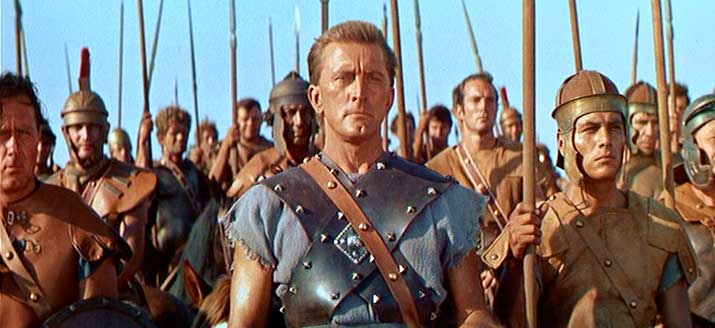How Kirk Douglas Ripped the Blacklist Apart

Hollywood has a unique and shocking history: sometimes the shimmering success of the film business shaped the world for good, but its dark chapters influenced American history just as strongly. Kirk Douglas, leading man and Hollywood legend, is the perfect person to recall the different evolutions and eras of Hollywood; and in his latest memoir I Am Spartacus!: Making A Film, Breaking The Blacklist (Open Road Media), Douglas chronicles a particularly disturbing time in Hollywood history.
With the whole country terrified of communism, the HUAC hearings focused on the film industry as a supposed hotbed of Communist activity. The studio heads met at the Waldorf-Astoria and agreed to blacklist anyone named as a sympathizer, and anyone who had testified they had once been affiliated with a named “Communist front” group. The careers of many both up-and-coming as well as established actors, screenwriters and directors were ruined—as, often, were their lives. Douglas entered this Hollywood world as a young stage actor raised in upstate New York by two Russian immigrant parents. He rose to fame and founded his own production company, Bryna, named after his mother—and then discovered Stanley Kubrick, a young director Douglas decided to champion after seeing his first film.
Kubrick and Douglas made Paths Of Glory together; then Douglas decided to champion an even bigger outsider, a blacklisted screenwriter named Dalton Trumbo who adapted the novel Spartacus, written by another convicted Communist, Howard Fast. In his memoir, Douglas chronicles with humor, insight, and fearlessness his decision to make Spartacus despite threats that it would destroy his entire career.
Despite suffering from a stroke, Douglas is funny, warm, and fascinating, recounting his tale with pitch perfect detail and a fervor that brings his past to life. We had the honor of speaking with Douglas from his Hollywood home, where we discussed his journey from upstate New York to Hollywood, his mother’s motto he never forgot, how Spartacus helped break the blacklist, and the legacy of his famous film.
———
ROYAL YOUNG: Can you describe your journey from upstate New York to Hollywood star?
KIRK DOUGLAS: I hitchhiked to New York with a few dollars in my pocket. My first job was on Broadway. Then I went into the Navy. When I came out of the Navy, I went back to Broadway and a friend of mine, Lauren Bacall, was in Hollywood filming with Humphrey Bogart. She told one of her producers I was great in my play and he saw it and cast me in The Strange Love of Martha Ivers. I took a train out to Hollywood and the whole time I studied the part I thought I was supposed to play. But when I got there, I realized I had been studying the wrong part. The first day they sent a limousine to pick me up and I was very impressed. But when we got to the studio, there was a whole line of picketers. The workers were protesting the studio, and so I had to sleep there for three days.
YOUNG: Why was it so important to you and your mother to name your production company Bryna, after her Russian name?
DOUGLAS: Well, you know, my mother, we were a very poor family. When I was a kid, we would be in our little room and there would be a knock on the door almost every night with a hobo begging for food. Even though we didn’t even have enough to eat, my mother always found something to give them. And she said something to me that I never forgot. She said, “A beggar must always give to another beggar that’s worse off than he is.” That has always stuck with me. It has helped me through a lot of things that I’ve done. Have you ever had a stroke?
YOUNG: I haven’t, but I’ve known people who have.
DOUGLAS: See, I have and I’ve been working on my voice for 50 years. You can understand me, but you didn’t have a stroke and I have trouble understanding you. [laughs]
YOUNG: As long as I can understand you and you know that my questions come from a good place, I think we’ll be fine.
DOUGLAS: I’m afraid this may be a very strange interview.
YOUNG: Not at all.
DOUGLAS: Why don’t I just talk?
YOUNG: I would love that.
DOUGLAS: When I first came to Hollywood, the blacklist was just starting, and they were having hearings in Washington. What most people don’t know is the judge of these hearings himself was later convicted of misappropriation. Spartacus helped break the blacklist, because Spartacus was a real character. He was a slave who rose to greatness in the arenas of the Roman Empire.
YOUNG: Could you tell me more about how Spartacus helped break the black list?
DOUGLAS: Well, my company, Bryna produced it and I wanted to get the best writer. The best writer was Dalton Trumbo, who had served a sentence in jail and then moved to Mexico. But when he came back, he wrote the script in secret under the name Sam Jackson. He was a wonderful guy, and it was terrible that he had to hide his name. I think because I was young enough I had more guts—when you’re older, you have more to lose. I got a call from Otto Preminger, who said, “You’re working with a blacklisted writer!” He was very mad at me. I said “I don’t care,” and he hung up.
YOUNG: [laughs]
DOUGLAS: [laughs] You know, when you get to be 95, which I am, you can enjoy the past. I’m proud of using his name and breaking the blacklist. That was a terrible time in Hollywood history. It should never have happened. We should have fought it. But it’s over and I, in my old age, take solace in the fact that I remember.






